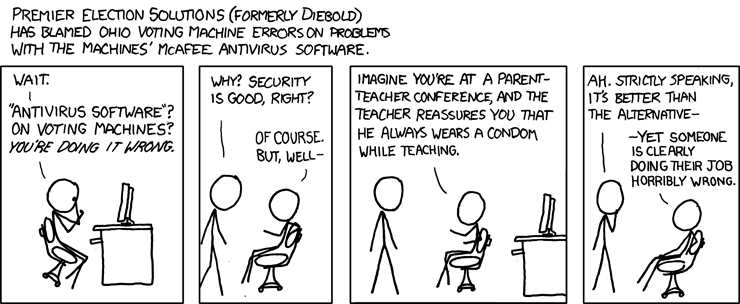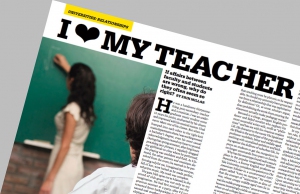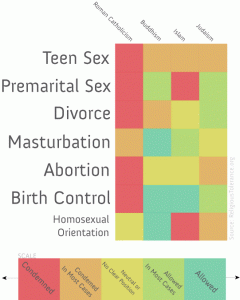Given the extreme consequences we mete out to sexual transgressors1, we must more than ever before reflect on how we know that our outlawed sexualities are innately harmful – that is, damaging by their nature alone, excepting their violent, life-destroying extrinsic consequences. A few main points I would like people to consider:
- The exacerbating effects of the secrecy and isolation necessary in age-disparate relationships merits analysis.
- Psychology has before failed to test assumptions based on social norms. (e.g., homosexuality)
- Mandating the status of victim on people who don’t want it is inhumane.
- Insisting that someone is hurt in an invisible way and might not even know it should be regarded skeptically. It is a claim that is difficult to falsify2 and is therefore pseudoscientific.
- Sacrosanctity isn’t necessarily correctness.3
Today I’m going to comb through a report4 on female teacher sexual transgressors.

Randall Munroe, xkcd: Voting Machines
The November 3rd, 2014 edition of Maclean’s promises on its cover “SEX OFFENDERS NO ONE SUSPECTS: FEMALE TEACHERS.”5 Turn to page 44 and you will find a report by Anne Kingston that assumes the prejudices of our sex-supressing culture and does nothing to question the abominably evil reality that you must be a victim merely because the true believers in the legal system and their pseudoscientific enablers in the bowels of psychology6 say you must be. Okay, maybe I’m a bit cynical, but hear me out. (Or read the vastly shorter letter I wrote to Maclean’s.)
Now, before I get into this:
- I acknowledge that there are cases of despicable manipulation and monopolization that merit a response that may need to include prosecution.
- I also acknowledge that anyone who feels that they have been abused must have gone through severe stress and torment, although it might be at the hands of society and the legal system and not wholly or even necessarily reflecting the nature of the stigmatized activity.
- I’m not suggesting that the silence around coercive, stultifying abuse isn’t worse than the silence around consensual7 activity.8
- And, as I’ll say again in a second, for a teacher to bring the world crashing down on herself and a student and everyone else in the vicinity, is plain nuts.
Large categorical taboos mean that everything gets painted with the same broad brush, and Maclean’s is, consciously or unconsciously, content to maintain our categorical thinking merely by using the term “sex offender”, as it covers everything from consensual sex that happens to be against the law to kids being whipped within an inch of their lives for the sake of producing pornography for violentophiles9.
Kingston’s thesis is simply that “the treatment of female teachers who sexually exploit male students reflects legal and cultural double standards.” It’s borne out – females get probation and time served while males go to the crowbar saloon. But I worry that the way we’ll fix the double standard is by making non-normative females and their lovers as miserable as the non-normative males and their lovers.
Elsewhere, in “Why Privacy”, I’ve commented on how taboos tank our ability to monitor for ethical and consensual behaviour (other than the taboo itself being flouted). Quick example: Our prohibition of youth alcohol consumption drives parties to be held in secret. I would also add that, at least here, there is a selection effect to consider: The teachers who would allow themselves to get involved with public school students, knowing the outrage and persecution that would await both them and their “victim”, are perhaps more likely to be wanting of the scruples involved in treating other people decently. Nevertheless, this is an extrinsic effect. The violent, carceral outrage of society doesn’t make something innately evil. Examples abound: The treatment of homosexuals in Iran, for instance.

Or their treatment in our own past, quite frankly. (Wikipedia)
I put victim in scare quotes, but I suppose I shouldn’t because being a victim against your will is probably one of the worst things that could happen to you. Imagine your lover being torn from you by the state and incarcerated while your own life is turned upside down, all while victimophile psychologists tell you your love is a delusion. That is some evil, evil shit, and Anne Kingston doesn’t address it. The article is mostly fear porn, and I won’t go so far as to suggest Kingston and Maclean’s are trying to be nasty10, but it’s fear porn that a lot of people are going to read by dint of its being in the national newsmagazine. A Sun News opinion column11, I might ignore. But maybe I’m shortchanging everyone else for their ability to resist prejudice-driven reason.
I’m sure Maclean’s has published lots of sex panic articles before, of course, but the time has long passed to push back against people who are motivated by fear and prejudice, especially legally and institutionally enshrined fear and ignorance. If fascism makes a comeback, it will be to save the children from sexuality.12 But it’s not all doom and gloom: Maclean’s admits it did its part in uncritically spreading the marijuana panic.
The article begins with the case of Tania Pontbriand, a former high school gym teacher from Rosemère, Quebec. She was 30 and he was 15.
“In a written statement, the student stated that Pontbriand ended it after he entered CEGEP, saying she’d met someone new. He went to police in 2007 after being expelled; later he claimed the relationship left him depressed and suicidal. The victim, now in his 20s, said a psychiatrist helped him understand he’d missed out on normal dating rituals. Pontbriand, now a mother of two, alienated him from family and friends, he said, ‘so as to satisfy her own egotistic and sexual desires. I was far too naive at the time to recognize her lies and manipulation.’ The judge agreed: ‘The court is convinced that the accused used the victim to satisfy her own sexual needs, thus exploiting the victim’s naïveté, his lack of maturity, his dependence and his trust.’”
Some of this can happen in any bad relationship, legally-sanctioned or not. If your loved one drops you like a bag of rotten potatoes, it will leave you reeling. (It’s part of the bullshit that attends our system of serial monogamy.) If the boy missed out on normal dating rituals, it was because they couldn’t openly date – this part of the problem is almost entirely extrinsic, like how getting gunned down by the mob would be an attendant risk of getting into the alcohol distribution business during Prohibition. I would say the same for the alienation – if society prohibits your relationship, of course you’re going to be alienated! So far, all of this could easily happen with any outlawed sexuality (e.g., homosexuality, depending on where you are, or closet cases). None of it reflects particularly on this taboo, except…
Ah, age! Yes, a typical 30 year old is orders of magnitude more experienced than a typical 15 year old. But what’s wrong with that?
Only in sex are we so fearful that an experience advantage be used against, as opposed to for, the inexperienced party. It is like assuming a father teaching his son how to play goalie will immediately unleash slapshots to rival Al MacInnis. Perhaps a few cruel and sadistic fathers would. So, of course, our response should be to only allow inexperienced people to teach each other how to play hockey, because any experienced teachers will necessarily abuse their students.

Roberto Luongo: Victim of hockey abuse. (David G. Steadman, Flickr)
A more reasoned ethic than “don’t” for relationships with an age disparity is the Campsite Rule13. As summarized on Wikipedia:
“In a relationship with a large age and/or experience gap, the older partner/more experienced partner has the responsibility to leave the younger/less experienced partner in at least as good a state (emotionally and physically) as before the relationship. The campsite rule includes things like leaving the younger/less experienced partner with no STDs, no unwanted pregnancies, and not overburdening them with emotional and sexual baggage.”
Anyway, getting away from a Utopian world of sex sanity and back to the real one:
“In March, 59-year-old Deborah Marion Ralph, a former Langley, B.C., elementary school teacher, avoided jail after pleading guilty to sexual interference with a student who was 11 when a three-year relationship began in 1998; Ralph was 44. … A psychiatrist for Ralph’s defence reported that the former teacher suffered from ‘teacher-lover’ syndrome, a clinical term dating to the late 1980s to describe teachers, usually female, who believe they’re in a consensual romantic relationship with students.”
Ah, psychology! Always there with a diagnosis for anything society thinks is wrong. And if you disagree, you’re deluded! This is the same body of knowledge that considered homosexuality a mental illness until the 1970s. At least in this case, the bullshit was used to reduce Ralph’s penalty to “18 months house arrest, six months curfew and community service.”
Let’s think about this, though. “Teacher-lover syndrome.” If you teach, you can’t also love (at least not sex-inclusively). It’s not just a social construct, it’s in the plumbing.14 How did psychologists demonstrate this diagnosis reflected something innate rather than an assumption of culture?
Kingston rests her report heavily on the opinions of Robert Shoop, a professor of education law at Kansas State University and “an internationally recognized expert on sexual harassment and abuse prevention in schools.” He contributes the most quotes to the article, but he’s a specialist in education law, not a scientist or even a psychologist.
“A male having sex with a minor child is recognized as a horror, which of course it is, he says. ‘But in cases where a female had sex with a minor boy, there have been many examples of judges saying “Where’s the harm here? He bragged to his friends about it, how could be hurt?”’”
These judges have far too much common sense for their own good! He’s hurt because the catechisms of psychology insist he must be hurt, of course.
“Male teachers who have sex with underage female students are viewed as statutory rapists or creeps; women who do the same are perceived as doing the boy a favour or providing a rite of passage, evidenced by the inevitable ‘Where was she when I was in high school?’ cracks.”
I believe that this discrepancy is due to our demonization of male sexuality. Remember how people polled in the 90s were more ready to accept two women holding hands than two men? (I can’t seem to find it, so maybe it’s a figment of my imagination.) As an aside, woe to the girls who love older men, teachers or not – your lover could be incarcerated and you will be made a victim against your will.
So far, we’ve had the sense not to demonize female sexuality – we usually just settle for denying it exists. A “1966” headline in The Onion’s Our Dumb Century reads “Female Orgasm Discovered”.
“We’re just beginning to understand sexual abuse by female teachers and its consequences, says Shoop, who calls it ‘abhorrent behaviour that’s epidemic.’ People don’t appreciate how frequently it occurs, he says: ‘The conversation is probably where the abuse of children by priests was 10 years ago.’”
It’s abhorrent, of course, because it’s abhorrent. I’m sure there are lots of people who consider homosexuality to be abhorrent and epidemic.15 It’s interesting how awful a view this presupposes: Legions of sick, depraved teachers engaging in abhorrent behaviour. All over the place! What can we do to stop it? Can psychology, psychiatry, and the prison-industrial complex provide a solution? Will it work as well as the treatment of homosexuality? Of pedophilia?

Holmesburg Prison, Philadelphia (Wikipedia)
Kingston, in the course of airing the canonical sensationalized template for female-teacher-and-male-student relationships, references another one:
“The sensationalized template for the female-teacher-and-male-student relationship remains mired in the decades-old spectacle of California teacher Mary Kay LeTourneau, a married 34-year-old mother of four who was jailed in 1997 for second-degree rape of her 12-year-old student, Vili Fualaau. … The couple, who would have two children and marry, turned their ‘illicit love’ into an industry with a tabloid-ready happy ending.”
We must put ‘illicit love’ in quotes because in order to justify the persecution of love, we have to deny that it is in fact love. Psychologists are all too happy to help.
“Media, along with screenwriters, are complicit in shaping attitudes, says Shoop, who points to criminal behaviour bring referred to as a ‘steamy affair,’ or rape referred to as an ‘inappropriate relationship.’ It’s a confusion write large culturally: Netflix categorizes A Teacher – a very bad movie about a sexual relationship between an unhinged young female high school teacher and her male student – under ‘romance.’”
Media, along with Maclean’s writers, are complicit in shaping attitudes, writing articles justifying persecution and incarceration with regards to love that society refuses to understand or even tolerate. They quote people who want us to never think of how people who aren’t allowed to have sexual agency, might in fact have sexual agency, and who misuse the word rape in order to insinuate that consensual activity that is illegal should be treated the same way as non-consensual activity.
“Over the past year, we’ve seen a barrage of allegations and stories involving female teachers having sex with students. This month, the Internet exploded when two Louisiana teachers, Shelley Dufresne, 32, and Rachel Respess, 24, were arrested for ‘carnal knowledge of a minor,’ [illegal information!] for allegedly engaging in a ménage à trois with a 16-year-old male student after he bragged about it.” [emphasis mine]
Why can’t these young men understand that they’re victims? Someone get them into a therapist’s office, or call a social worker!
“It’s believed boys self-disclose more than girls when the relationship is going, says Shoop – ‘they’re pretty excited and proud of it.’ Still, generally only five to 15 per cent of people who are abused ever tell anybody, he says.”
Well, you know, maybe if they don’t feel like they’re being abused, it just might be possible – and I know I’m going out on a limb here – that it’s not actually abuse. And as for girls self-disclosing less: Duh. It’s way more explosive, and they’re smart enough to know that the world is going to come crashing down on them if they do. (I’m thinking of consensual situations, though having to report the innately nasty ones would also mean taking on all the stigma.) And if you’re going to insist that consensual activity is abuse, you’re going to get pretty low rates of self-reporting about this “abuse” in any case.
“In 2013, Ottawa teacher Andréane Hélène Cadieux lost her licence for inappropriate behaviour that included ‘exposing her breasts’ during an online chat with a student.”
I guess we’re not going to get any clothing-optional schools anytime soon.
“School boards routinely provide guidelines on ‘apporpriate’ social media interactions. The Ontario College of Teachers advises teachers against even becoming Facebook friends with students, spokesperson Barkany says.”
Of course, because if you’re interacting on social media, you might interact like free human beings outside of institutional control, and then OMG THE SEX
Kingston speaks with clinical forensic psychologist Franca Cortoni, a professor at Université de Montréal who “studies female sexual offenders, a field of research in its infancy.” (If the triumph of egalitarianism is demonizing female sexuality as much as male sexuality, please shoot me now.) Cortoni at least offers a glimpse of sanity:
“Cortoni rejects the term ‘predator,’ coined by American lawmakers in the 1990s. Canadian experts in the field don’t use it, she says, noting it’s not accurate or useful: ‘When you think of predators, you think of monsters – the Paul Bernardos. But 85 to 90 per cent of sex offenders are people the victim knows and loves – someone who makes them feel loved. That’s what people forget.”
Someone who makes them feel loved by, you know, loving them. But if you introduce anything sexual, of course it must then become a terrible, terrible thing. Of course, when an idea like this is voiced, it will be followed with an explanation of why it’s so terrible17, and why it’s worth the incredible persecution we bring to bear on it.
“The term creates dissonance for the victim, she says: ‘There’s this idea that boys want to go to bed with an older woman – it’s a cultural fantasy. But if the kid is not comfortable, how does he report – how does he go against these messages that it’s a cool thing to have sex with an older woman?”
So if the kid isn’t comfortable, the thing to do is to report to law enforcement. How about, before engaging that nuclear option, something like saying, “I’m not comfortable with this?” And if that’s not respected, then we’re dealing with a whole different thing – rape – or, as we’re increasingly having to say, “rape rape”. Yes, then you should report, and go against all the cultural messages about it being a cool thing. And that sucks!
Imagine living in a regime where sex is illegal, full stop. Oh, alright, they’ll probably allow it inside marriages. So outside marriage, then.
Sex outside of marriage is illegal, but there are a lot of people having it. Word is going around that sex is a cool thing. It feels really really really fucking good. It’s like all this time you weren’t able to breathe and didn’t even know it and now suddenly you can live fully as a human being.
And someone gets raped.
And then that person has to go against all the cultural messages that sex is cool. And they look like they’re a spoilsport, ruining things for everyone by involving law enforcement in what was up until then a harmless open secret. They might be harassed and disbelieved, and worse.18
I feel for the young man in that situation, I really do. But creating injustice for many others just to prevent a few people from getting into bad situations is bad moral calculus. And keep in mind that the prohibition creates an oversight-free black hole for this young man to fall into, enabling a bad variety19 of the behaviour it intends to but doesn’t anywhere near completely extinguish.
“Absent is any concept of ethics or boundaries or professionalism, says Shoop. But students, too, haven’t been educated in what is acceptable or unacceptable behaviour, he says. The 16-year-old who claimed to have a threesome with his teachers was shocked to learn they could go to prison.”
If he followed the ethic that if it feels good and doesn’t hurt others, it should be okay, then he should be shocked. Anyway, Shoop, you’d better hurry up and Educate™ people to be unreflectingly obedient to our taboos! The sex epidemic is spreading! Oh, and get Sloan and Pharrell off the radio.
“Men bristle at the sexual victim label: On the tabloid TV show Inside Edition, Vili Fualaau denied he’d been preyed upon: ‘I’m not a victim… I’m not ashamed of being in love with Mary Kay.’”
I would be. Those multi-level marketing outfits are sleazy.
Oh.
“The situation can be especially complicated with children, says Shoop: ‘It’s difficult for people to understand that a boy, like a girl, can willingly participate, even enjoy the experience, but still be exploited,” he says. ‘We assume that children have to perceive damage for damage to have occurred; but there is long-term damage to both males and females. The child becomes sexualized; he sees himself as a sexual object and many times has a difficult time developing appropriate relationships with appropriately aged people.”
Appropriate, appropriate. This isn’t reason, this is religion. The ‘damage’ from doing the inappropriate thing is an increased propensity to do the inappropriate thing. Similarly, if someone takes me jogging, and I enjoy it, I have an increased propensity to jog. And I might have difficulty settling for walking anymore – why walk when I can jog? But jogging, fortunately for Running Room, isn’t illegal.
And look at that word, “sexualize”. Our default state is affirmed to be something non-sexual. To that I say balderdash.20 Anyone who’s ever been around actual children or remembers being one must know the insane lengths gone to to isolate children from the sexual knowledge and shenanigans of adults. It’s just “not appropriate” for kids. Until today it’s seldom been openly questioned. I’m going to write an essay on what I call the mandatory Puritanization of children. It’s only when we hold the view that suppression of sex (including fear of being without clothing) is something innate and natural that we can complain of the “sexualization” of children rather than seeing it as reflecting a yearning to be free, or perhaps just plain curiosity.21
Let’s change the present-day young-old taboo to the old-time premarital taboo and see how it reads:
“The situation can be especially complicated with unmarried people, says Stinkey Poohs, director of the American Institute for Family Hygiene: ‘It’s difficult for people to understand that a man, like a woman, can willingly participate, even enjoy the experience, but still be exploited,” he says. ‘We assume that unmarried people have to perceive damage for damage to have occurred; but there is long-term damage to both males and females. The unmarried person becomes sexualized; he sees himself as a sexual object and many times has a difficult time developing appropriate platonic relationships with his fellow unmarried people.”
Of course that seems farfetched to us now – we’ve, largely, gotten used to the idea of premarital sex. Of course, we still treat relationships like mini-marriages and persecute each other for something called ‘cheating’, but baby steps!
“Testimony shows teenage boys to be emotionally vulnerable as well. The boy [16] involved with Denise Keesee [of Oregon, 39] was convinced they would marry.23 The teenager who Jennifer Mason exploited claimed he still loved her and would go to jail for her. He denied being victimized; Judge Dunnigan disagreed, saying the teenager could be a ‘ticking time bomb’.”
Ticking time bomb for what? Acting on an ethic of sexual freedom?
Oh, no, it’s “someone who will likely someday realized just how victimized he was.”24 Yes, but only if he hangs around with psychologists, therapists, or social workers. Otherwise, he may be safe.
Not only is mandating the status of victim on someone who doesn’t want it inhumane in and of itself, there’s something sinister about insisting that someone is hurt in an invisible way and might not even know it. It should be regarded as skeptically as we would Recovered-memory therapy25 and Facilitated communication.
Susan Clancy’s book The Trauma Myth seems to open the door halfway, at least making it clear that the “abuse” itself isn’t typically traumatic, arguing that “later in life, after the memories are processed, examined, and more fully understood, the experience becomes traumatic.”26 Here is an excerpt from a review by Peter Herman:
“All interviewed subjects reported current emotional distress. The disparity between their child and adult states of mind had to be resolved. After investigating all possibilities where her data could be wrong, Dr. Clancy concludes the traumatogenic model to be tautological. In other words, the model is true because it is true: nothing that children experiencing sexual contact (she uses the term “victim”) said could make “experts” believe them when they reported not feeling abused. Her examining of the very few studies where “victims” were specifically asked what their “abuse” was like when it happened confirmed her conclusion.”
She does, however, contend that it is still abuse.27 Nevertheless, it is a big deal to show that the abuse itself is tautological – it’s abuse because it’s abuse. We tell people that they’ve been through a horrible thing and that they’ve been betrayed, and many believe it. Standing up to the claims of industrialized victimhood28 is incredibly taxing. Young people – less likely to be knowledgeable, less likely to be trained in critical thinking, and, often unfairly, less likely to be believed – have almost no hope of being able to do so. In fact, they could be downright brainwashed – recall that, for the young man in the Pontbriand case, a psychiatrist “helped him understand he’d missed out on normal dating rituals.” While factually true, the missing out is easily explained by the stigma alone, and I doubt the psychiatrist had much interest in either realizing or explaining this to his client.
It is telling that psychology can’t dare to theorize along parsimonical lines unless it is shocked or shamed into doing so. A simpler explanation is preferable only when it is politically acceptable. But I’m going to stop for a moment and I’m going to let psychology off the hook. It reflects us. Inasmuch as psychology deals with human beings and inasmuch as some human beings just can’t handle the truth, we’re lucky it isn’t worse than it is.
“Even after proven guilty and sentenced, female teachers can be defended, evident on a ‘Support Tania Pontbriand’ Facebook page which attracted more than 150 members, many of them former students. ‘Unbelieveable,’ wrote one. ‘This was probably the best teacher I had in my entire life. It’s funny to see this blown out of proportion just because she was a teacher. No one would have bat[ted] an eye otherwise!’ Such statements reveal how much we have to learn, says Shoop. ‘You hear these women described as an “excellent teacher,”’, he says: ‘But if you molest children, you can’t be an excellent teacher.’”
It sounds like that disbelieving person won’t be finding a career in psychology or law enforcement any time soon unless they recant their heresies. Maybe they’re a ticking time bomb, too, about to explode into accepting our sex-negative catechisms. And Shoop pays us one last linguistic outrage by cracking out the tried-and-… um, true? “child molester” verbiage. The fact that the Pontbriand case and “child molester” occupy the same paragraph disturbs me. For some odd reason, I put a bit of distance between a willing 15-year-old anatomically developed male and a boy of St. Vincent being tormented while being implored to sleep (at least that’s what I saw on TV). Of course a 15-year-old can be abused, but it’s not abuse just because the law and its enabling29 psychologists say it is. And in my Utopia it would be illegal to call a 15-year-old a child in order to advance a sex-negative political agenda30, but I’m not holding my breath.
Sexuality can be misused by authority figures and is misused by some. It’s possible that there are teachers out there doing unfair-to-others things like “Sleep with me and you’ll get an A,” or, probably worse, “Sleep with me or you won’t get that A.” But I think we should consider that keeping sexuality secret, which our legal and social regime mandates when it comes to students and teachers, deprives us of our ability to see this, and the secrecy itself drives much of the harm that we then cite as a reason why this should be illegal. It’s a self-fulfilling prophecy.

Erin Millar, “I ♥ My Teacher” (erinmillar.ca)
Meanwhile, in the university world, at least in Canada, you can legally love your professor. Erin Millar wrote about her own experience, and it appeared in Maclean’s: “I ♥ My Teacher”. Here’s an excerpt. There’s hope for humanity.
“Every critic of student-faculty romance I spoke to first raised the power differential argument. The idea is that students can never give meaningful consent in a close relationship with a professor. In a 2000 paper, [Shirley] Katz [a lawyer and senior scholar at York University in Toronto] describes how professors have ‘the power to grade and evaluate a student’s work, the power to provide references for graduate and professional schools and for jobs, the power to serve as intellectual or career mentors and sometimes as role models.’ So even if there is no promise of reward or threat of punishment, the student’s vulnerability makes that relationship, ipso facto, exploitative.
“Katz says that there is statistical and anecdotal evidence showing a significant number of students who dated their professors changed their minds after a period of time about whether the relationship was exploitative. Had I changed my mind about my relationship with Peter, she asked.
“I remember how debilitating my nervousness was in the hours leading up to that first date; it was certainly not the same butterflies-in-my-stomach feeling caused by dates with my peers. I wanted to look and sound grown-up, to entice him with my brain rather than only with my twentysomething body. Yet when we were sitting across from each other in an out-of-the-way restaurant, the conversation flowed with ease and our voices got louder as we traded stories. The chemistry between us was of real substance. We talked until the bar closed and then in my apartment, until the sky along the horizon brightened. Every act of intimacy, however small, was anxiously initiated. We moved slowly and nervously, over many hours, like teenagers.
“This is where, in my experience, the meaningful consent argument breaks down. None of my peer lovers had ever proceeded with such care. With every touch, every kiss, consent was solicited and granted. Surely I, at the age of 22, was able to experience legitimate attraction to a man and make the decision to act upon it. Was I attracted to Peter in part because of his prominent position at our school and in the music community? Of course. But what makes that less valid than any other reason for sexual attraction?
…
“I believe my love affair with Peter was not exploitative. That does not mean no student-faculty relationship is. But it does not follow that because some romantic relationships between students and professors are based on a power imbalance, all students who date their teachers should be considered unfit to give consent. Power dynamics—age, attractiveness, accomplishment—are part of every relationship, no matter where lovers meet. As UCLA professor Paul R. Abramson, author of Romance in the Ivory Tower, said, “People make foolish sexual choices. It’s always important to make conscientious choices in life. But to legislate that in any venue is absurd.”
If we’re going to go to war with ourselves and hate something that feels good and shows no reliably verifiable innate signs of harm, I think we’d better have a damn good reason. Read the opening paragraph on Wikipedia’s “Homosexuality and psychology” article:
“Psychology was one of the first disciplines to study homosexuality as a discrete phenomenon. Prior to and throughout most of the 20th century, common standard psychology viewed homosexuality in terms of pathological models as a mental illness. That classification began to be subjected to critical scrutiny in the research, which consistently failed to produce any empirical or scientific basis regarding homosexuality as a disorder or abnormality. As a result of such accumulated research, professionals in medicine, mental health, and the behavioral and social sciences, opposing the classification of homosexuality as a mental disorder, claimed the conclusion that it was inaccurate, and that the DSM classification reflected untested assumptions that were based on once-prevalent social norms and clinical impressions from unrepresentative samples which consisted of patients seeking therapy and individuals whose conduct brought them into the criminal justice system.”
Does that sound familiar?
Only in 1973 did the American Psychiatric Association declassify homosexuality as a mental disorder. Writes Paul Lutus in his essay “Is Psychology a Science?”:
“Many conditions have made their way into the DSM and nearly none are later removed. Homosexuality was until recently listed as a mental illness, one believed to be amenable to treatment, in spite of the total absence of clinical evidence. Then a combination of research findings from fields other than psychology, and simple political pressure, resulted in the belated removal of homosexuality from psychology’s official list of mental illnesses. Imagine a group of activists demanding that the concept of gravity be removed from physics. Then imagine physicists yielding to political pressure on a scientific issue. But in psychology, this is the norm, not the exception, and it is nearly always the case that the impetus for change comes from a field other than psychology.”

Godfrey Kneller portrait of Isaac Newton (1643-1727), pioneering gravitation propagandist (Wikipedia)
I want to close by saying that I don’t condone grade-school-teacher-and-grade-school-student relationships today, but it’s for the same reason that I wouldn’t condone people I care about getting involved in the alcohol industry during Prohibition. I don’t believe there’s anything innately wrong with age-disparate sexuality, but it’s still extrinsically wrong to involve anyone in it here and now because of all the life-destroying authoritarian power that falls on both parties. The older party will go to jail to be raped for being a “sex offender”, the younger to a government-friendly psychologist to be instructed that they’re a “victim”. A victim they are, but only because their innate, real consent is being violated by being told they can’t legally consent.
Not to mention sex workers! Thank the FSM for sex workers and their advocates on Twitter. Here’s @SugarKovalczyk: “Some of y’all should reexamine your beliefs in a historic & global sense while recognizing how late 20th century hysteria has shaped you so far.” I also recommend this essay by Mistress Matisse on the “End Demand” Campaign. Quote: “End Demand activists are quick to say ‘prostitution is not a victimless crime.’ Not while they’re around, it won’t be.” ↩
Meaning that it’s hard to compare the idea to reality – this comparing is the perspiratory part of science. Paul Lutus’ essay “Building Science” begins by explaining falsifiability. ↩
As David Dunning writes in Pacific Standard: “Some of our most stubborn misbeliefs arise not from primitive childlike intuitions or careless category errors, but from the very values and philosophies that define who we are as individuals. Each of us possesses certain foundational beliefs—narratives about the self, ideas about the social order—that essentially cannot be violated: To contradict them would call into question our very self-worth. As such, these views demand fealty from other opinions. And any information that we glean from the world is amended, distorted, diminished, or forgotten in order to make sure that these sacrosanct beliefs remain whole and unharmed.” – from “We Are All Confident Idiots”
For an extended take on this in the context of American politics:
Jonathan Haidt – “Why So Many Americans Don’t Want Social Justice and Don’t Trust Scientists” (2013 Boyarsky Lecture in Law, Medicine & Ethics, Duke University) ↩Anne Kingston, Maclean’s – “Female teachers: The sex offenders no one suspects” ↩
Paul Lutus, Arachnoid.com – “Is Psychology a Science?” ↩
“Consent” is a legally-blinkered term, not a humanistic one. It suggests that you’re agreeing to something that is against your interest by default. It belongs in draconian places like employment law – you consent to have no privacy, you consent to being able to be fired at will.
But this is the term we have, so I assert that consent that is not legally recognized can yet be consent on the principle of mutual self-determination (infinitely more important, provided you’re not getting together to plan a shooting spree), but I’d rather just avoid the word, not to mention the simplistic arguments that follow that rest directly on the socio-legal recognition of consent rather than addressing the actual nature of our sexuality. (“I won’t debate this with you because you refuse to recognize that an n-year old can’t consent.”)
I also reject the idea that sexuality is as necessarily fraught as getting a mortgage. Oh, sure, it frequently ends up being a great big mess, but I think most of the problems with it are extrinsic – the dictates of our nature perpetually clash with the established social order, one that forces us to live in ignorance.
As a thought experiment, imagine if the sexual standard for consent applied in other areas. Let’s say food. You could argue that children shouldn’t be fed because they don’t understand exactly what is happening and what they’re agreeing to do. Consent is impossible. Being fed without consent is abuse.
I think even most pedophiles would be against coercion, but as long as people define a sufficiently high bar for legal consent in this single area, it’ll never be cleared, and we’ll have more food for the prison-psychiatric-industrial complex.
As a pragmatic friend says to me, “It is ultimately silly to come up with black and white rules about who can and cannot consent that are based on thresholds whose precise positions are arbitrary. But then, black and white rules are efficient for managing large populations.” Well, there’s a certain dehumanization in insisting that a large population be wholly united on all things and wholly managed the same way. For a counter-vision, read Scott Alexander’s “Archipelago and Atomic Communitarianism”.
I’ve been an ass about word choices before, and I probably will be again. I know I despise being told what words I can and can’t use. Our words reflect our identity. Rather than circulate lists of words, we should probably just reflect more often on the words we use – how we steer with our choices and are in turn steered by the choices of others.
Lezlie Lowe, Chronicle-Herald – “Defusing the landmines of language”
↩I think the silence is related, embedded in the same morass of sex-negative shame. But same silence or not, I think the silence is corrosive to the better angels of both interests. Think of this as you would a commentary about the danger of Islamophobia the day after 9/11. ↩
Of course, if you like looking at young people without their clothes on, you’re every single bit as depraved as the people who beat and torture children and who may or may not record it. Because reasons. ↩
Psychology might call it the fundamental attribution error ↩
Kevin Martin, Calgary Sun – “Calgary Catholic schoolteacher Jennifer Mason is a predator, pure and simple” ↩
See also: Russia.
Amnesty International: “‘My freedom defends yours’: Propaganda and truth about homophobia in Russia” ↩Dan Q – “Savage Love Readers Talk About the Campsite Rule” ↩
But it might be a useful social construct. We secretly cheer for people robbing banks, but we agree that it would be pretty chaotic if people were just coming into banks every hour with a gun and looting the safe. But one thing we don’t do: We don’t assign the bank-robbers “Bank-robber syndrome”. So there you have it: It’s part of being human to be inclined to steal (though I suppose “kleptomania” is a diagnosis), but not to be sexual. ↩
I heavily rely on acceptance of homosexuality because the process of breaking down taboos and prejudices is similar. In their TED Talk, “The Long Reach of Reason”, Steven Pinker and Rebecca Newberger Goldstein describe how successive movements for rights co-opt the principles of previous movements.
Homosexuality is also a decidedly non-reproductive mode of sexuality, and we use sex for far more than just reproduction. (If you doubt this, go read Sex at Dawn. If you’re in a relative hurry, here’s the co-author appearing in a TED talk.)
Indeed, there is some recognition that our sex offender panic is also a queer issue:
Andrew Extein, Huffington Post – “Why Queers Should Care About Sex Offenders” (It looks like Extein is attempting to start The [desperately needed] Center for Sexual Justice, and, much to my amazement, he is a social worker.)
Erica R. Meiners, Liam Michaud, Josh Pavan, & Bridget Simpson, Upping the Anti – ““Worst of the Worst”? : Queer Investments in Challenging Sex Offender Registries”
↩I briefly considered cloning out the man’s body hair to make a point, but why tempt our RCMP overlords. ↩
Well, having babies with your mother is probably a bad idea. ↩
I would be remiss if I didn’t acknowledge the Jian Ghomeshi scandal currently broiling this country, and how we are learning reasons why women would not report (even when the accused isn’t a celebrity we want to believe in). ↩
Or, if you think it’s all bad, an even worse variety. ↩
Christopher Ryan, co-author of Sex at Dawn, has a TED Talk: “Are we designed to be sexual omnivores?” ↩
Josh Gravens, Center for Sexual Justice: “To Lena Dunham: From A Person Placed on the Sex Offender Registry as a Child” ↩
Dunno if this is accurate. Don’t plan vacations or conversions based on it. ↩
In an ideal world, they might well have married. The naïveté is heartbreaking. Far better if they’d confined their relationship to the classroom, but if you’re going to involve someone in something like this, they can have no illusions about it. But illusions are hard to dispel. This goes for you and me too, but it goes doubly for the young.
Aside: Why illude children in the first place? I don’t mean don’t play “let’s pretend”, but why make them think, for example, Santa Claus is actually real? ↩
as paraphrased by Kevin Martin in his column insisting on treating two people with agency as predator and victim ↩
You’d think this would be in the dustbin of history by now. Alas, no:
Ed Cara, Pacific Standard – “The Most Dangerous Idea in Mental Health” ↩Wikipedia: “Susan Clancy” ↩
She is interviewed by Thomas Rogers in Salon: ““The Trauma Myth”: The child betrayed” ↩
Ofer Zur, “Culture of Victims: Reflections on a Culture of Victims & How Psychotherapy Fuels the Victim Industry” ↩
Oh God, I’m starting to sound like them – help! ↩
Would you have called Malala Yousafzai a child? She was writing about the Taliban for the BBC at the ripe old age of 11. ↩


